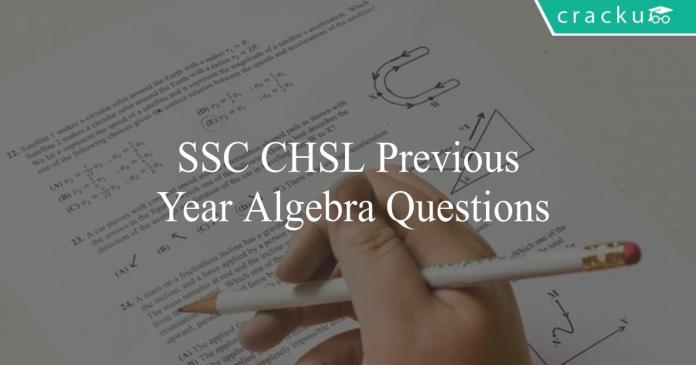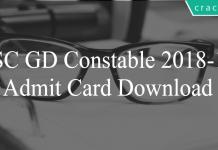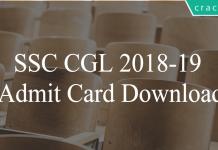SSC CHSL Previous Year Algebra Questions
SSC CHSL Algebra Previous Year Questions download PDF based on previous year question paper of SSC exams. 20 Very important Algebra questions for SSC CHSL Exam.
Download SSC CHSL Previous Year Algebra Questions
Download SSC CHSL Biology Previous Year Questions
Download Biology Previous Questions Set-1
Take a free mock test for SSC CHSL
Download SSC CHSL Previous Papers
Question 1: Which of the following has to be added to $36x^{2}-87x+52$ to make it a perfect square ?
a) 3x+3
b) -3x+3
c) 3x-3
d) -3x-3
Question 2: Which of the following has to be added to $16x^{2}-38x+23$ to make it a perfect square ?
a) -2x+2
b) -x+3
c) -2x-2
d) -x-3
Question 3: If a:b=6:5 and b:c=12:14 then what is the value of $a^{2}:b^{2}:bc$
a) 216:150:225
b) 108:150:175
c) 216:125:175
d) 216:150:175
Question 4: If a:b=7:3 and b:c=9:11 then what is the value of $a^{2}:b^{2}:bc$
a) 6:49:11
b) 9:49:11
c) 49:9:11
d) 49:9:13
Question 5: What is the least number that has to be added to $9x^{2}-30x+42$ to make it a perfect square ?
a) 17
b) -17
c) 7
d) -7
SSC CHSL Study Material (FREE Tests)
Question 6: What is the least number that has to be added to $4x^{2}-12x+3$ to make it a perfect square ?
a) -3
b) +3
c) -6
d) 6
Question 7: What is the least number that has to be added to $49x^{2}-28x+9$ to make it a perfect square ?
a) -5
b) 5
c) -8
d) 8
Question 8: What is the least number that has to be added to $9x^{2}-42x+36$ to make it a perfect square ?
a) -11
b) 13
c) -13
d) 11
Question 9: If a:b=1:4 and b:c=8:7 then what is the value of $a^{2}:b^{2}:ac$
a) 2:32:7
b) 1:16:9
c) 2:32:13
d) 1:16:11
Question 10: If $x^{4}+(\frac{1}{x})^{4}$=34 then what is the value of $x-1/x$
a) 2
b) 6
c) 8
d) 4
Question 11: If $x^{4}+(\frac{1}{x})^{4}$=727 then what is the value of $x^{3}-(\frac{1}{x})^{3}$
a) 140
b) 138
c) 134
d) 136
Question 12: If $x^{4}+(\frac{1}{x})^{4}$=119 then what is the value of $x^{3}-(\frac{1}{x})^{3}$
a) 36
b) 24
c) 42
d) 30
Question 13: If a and b are positive integers and $a^{2}-b^{2}$=11 then find the value of b+(1/b)
a) 21/5
b) 26/5
c) 13/5
d) 29/5
Question 14: If p and q are positive integers and $p^{2}-q^{2}$=59 then find the value of (1/p)+(1/q).
a) 59/870
b) 29/870
c) 3/87
d) 133/870
Question 15: If x and y are positive integers and $x^{2}-y^{2}$=31 then find the value of y.
a) 1
b) 30
c) 15
d) 16
FREE SSC MATERIAL – 18000 FREE QUESTIONS
Question 16: If 1
a) 1
b) 4
c) -1
d) -5
Question 17: If 2<x<3 then what is the value of $\sqrt{(x-2)^{2}}+\sqrt{(x-3)^{2}}$
a) 1
b) 5
c) -1
d) -5
Question 18: If 5<x<6 then what is the value of $\sqrt{(x-5)^{2}}+\sqrt{(x-6)^{2}}$
a) 2
b) 11
c) -1
d) 1
Question 19: If the sum of the interior angles of a regular polygon is $1260^\circ$ then how many sides does it have?
a) 10
b) 8
c) 9
d) 7
Question 20: Find the volume(approx) $(in cm^3)$ of a cube of side 6.5 cm.
a) 274.625
b) 264.625
c) 224.625
d) 314.625
DOWNLOAD APP TO ACESSES DIRECTLY ON MOBILE
Answers & Solutions:
1) Answer (C)
let us write the equation in the form of $a^{2}-2ab+b^{2}$
$(6x-7)^{2}$=$36x^{2}-2*6x*7+7^{2}$
But in the question it is given as -87x+52 so we should add 3x-3 to it in order to make it a perfect square.
2) Answer (A)
let us write the equation in the form of $a^{2}-2ab+b^{2}$
$(4x-5)^{2}$=$16x^{2}-2*4x*5+5^{2}$
But in the question it is given as 38x+23 so we should add -2x+2 to it in order to make it a perfect square.
3) Answer (D)
let a=6x,b=5x,b=12y,c=14y
5x=12y,x=12/5y
$a^{2}$=$36*x^{2}$
$b^{2}$=$25*x^{2}$
bc=$5x*5x*14/12$
bc=$175/6*x^{2}$
$a^{2}:b^{2}:bc$=216:150:175
4) Answer (C)
let a=7x,b=3x,b=9y,c=11y
3x=9y,x=3y,a=7x
b=3x,c=11x/3
$a^{2}$=$49*x^{2}$
$b^{2}$=$9*x^{2}$
bc=$3x*11x/3$
bc=$11*x^{2}$
$a^{2}:b^{2}:bc$=49:9:11
5) Answer (B)
let us write the equation in the form of $a^{2}-2ab+b^{2}$
$(3x-5)^{2}$=$3x^{2}-2*3x*5+5^{2}$
But in the question it is given as 42 so we should add -17 to it in order to make it a perfect square.
6) Answer (D)
let us write the equation in the form of $a^{2}-2ab+b^{2}$
$(2x-3)^{2}$=$4x^{2}-2*2x*3+3^{2}$
But in the question it is given as 3 so we should add 6 to it in order to make it a perfect square.
7) Answer (A)
let us write the equation in the form of $a^{2}-2ab+b^{2}$
$(7x-2)^{2}$=$49x^{2}-2*7x*2+2^{2}$
But in the question it is given as 9 so we should add -5 to it in order to make it a perfect square.
8) Answer (B)
let us write the equation in the form of $a^{2}-2ab+b^{2}$
$(3x-7)^{2}$=$9x^{2}-2\times3x\times7+7^{2}$
But in the question it is given as 36 so we should add 13 to it in order to make it a perfect square.
9) Answer (A)
let a=x,b=4x,b=8y,c=7y
4x=8y,x=2y,
a=x, b=4x, c=7x/2
$a^{2}$=$x^{2}$
$b^{2}$=$16\times x^{2}$
ac=$x\times7x/2$
ac=$(7/2)\times x^{2}$
$a^{2}:b^{2}:ac$=2:32:7
10) Answer (A)
$x^{4}+(\frac{1}{x})^{4}$=34
Add 2 on both sides
$x^{4}+2+(\frac{1}{x})^{4}$=34+2
($x^{2}+\frac{1}{x^{2}})^{2}$=36
$x^{2}+(\frac{1}{x})^{2}$=6
Subtracting 2 on both sides
$x^{2}+(\frac{1}{x})^{2}-2$=4
($x-\frac{1}{x})^{2}$=4
$x-1/x$=2
11) Answer (A)
$x^{4}+(\frac{1}{x})^{4}$=727
Add 2 on both sides
$x^{4}+2+(\frac{1}{x})^{4}$=727+2
($x^{2}+\frac{1}{x^{2}})^{2}$=729
$x^{2}+(\frac{1}{x})^{2}$=27
Subtracting 2 on both sides
$x^{2}+(\frac{1}{x})^{2}-2$=27-2
x-1/x=5
Cubing on both sides we have
$x^{3}-(\frac{1}{x})^{3}-15$=125
$x^{3}-(\frac{1}{x})^{3}$=125+15=140
12) Answer (A)
$x^{4}+(\frac{1}{x})^{4}$=119
Add 2 on both sides
$x^{4}+2+(\frac{1}{x})^{4}$=119+2
$(x^{2}+\frac{1}{x^{2}})^{2}$=121
$x^{2}+(\frac{1}{x})^{2}$=11
Subtracting 2 on both sides
$x^{2}+(\frac{1}{x})^{2}-2$=11-2
x-1/x=3
Cubing on both sides we have
$x^{3}-(\frac{1}{x})^{3}-9$=27
$x^{3}-(\frac{1}{x})^{3}$=36
13) Answer (B)
As 11 is a prime number we have
(a+b)(a-b)=11*1
a+b=11
a-b=1
2a=12
a=6
b=5
(b)+(1/b)=(1/5)+(5)
=(26/5)
The other case i.e a+b=1 and a-b=11 is not taken because it will give negative values for a and b.
14) Answer (A)
As 59 is a prime number we have
(p+q)(p-q)=59*1
p+q=59
p-q=1
2p=60
p=30
q=29
(1/p)+(1/q)=((1/30)+(1/29).
=(59/870)
the other case i.e p+q=1 and p-q=31 is not considered because it gives q value as negative.
15) Answer (C)
As 31 is a prime number we have
(x+y)(x-y)=31*1
x+y=31
x-y=1
2x=32
x=16
y=15
The other case i.e x+y=1 and x-y=31 is not considered because it gives y value as negative.
16) Answer (B)
value of $\sqrt{(z+1)^{2}}$ for 1Value of $(z-3)^{2}$ for 1So required sum=z+1-z+3
=3+1
=4
17) Answer (A)
value of $\sqrt{(x-2)^{2}}$ for 2<x<3 is $+$. Hence, +(x-2)
Value of $\sqrt(x-3)^2$ for 2<x<3 is $-$. Hence, -(x-3)
So required sum=x-2-x+3
=3-2
=1
18) Answer (D)
value of $\sqrt{(x-5)^{2}}$ for 5<x<6 is always positive and so we take +(x-5)
Value of $(x-6)^{2}$ for 5<x<6 is always $(-)^{2}$ an so we take -(x-6)
So required sum=x-5-x+6
=6-5
=1
19) Answer (C)
Given, sum of the interior angles of a regular polygon is $1260^\circ$
Sum of all interior angles of a polygon with $’n’$ sides = $(n-2)\times180^\circ$
Let the number of sides be $n$
=> Sum of interior angles = $(n-2)\times180^\circ=720^\circ$
= $(n-2)=\large\frac{1260^\circ}{180^\circ}=7$
=> $n=7+2=9$
=> Ans – (C)
20) Answer (A)
Side of cube = $a=6.5$ cm
=> Volume of cube = $a^3$
= $(6.5)^3=274.625$ $cm^3$
=> Ans – (A)





